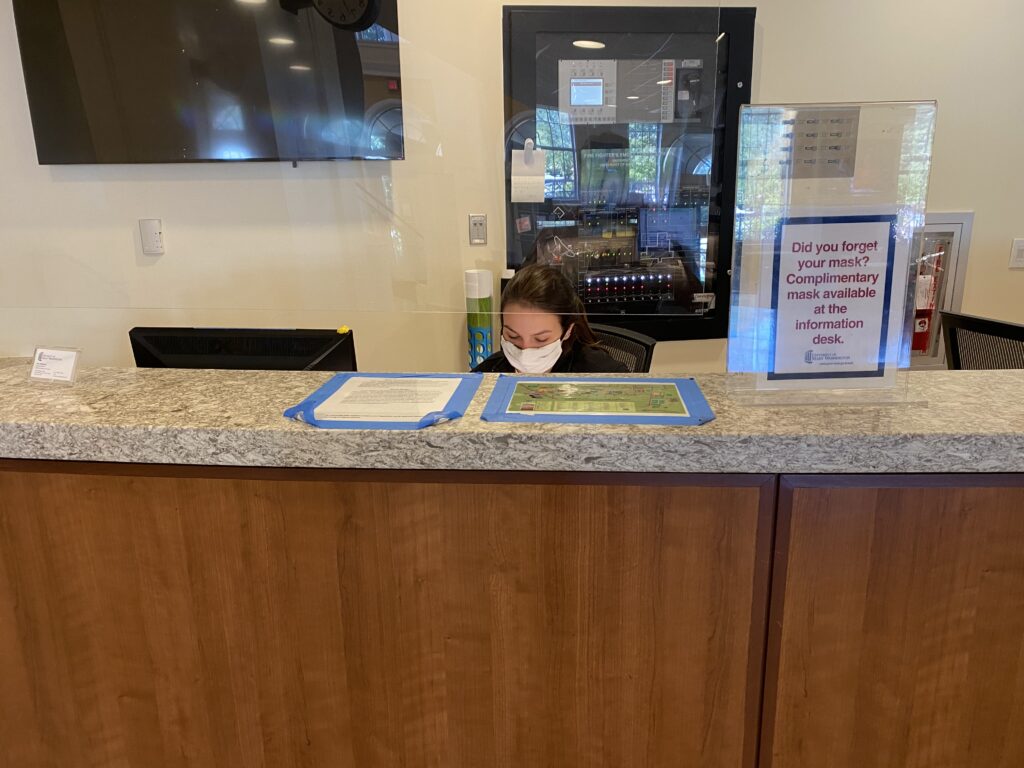Students need higher minimum wage
3 min read
Student employee Sofia Maggio working the UC front desk. | James Pryor, The Blue & Gray Press
By REBECCA HUCK
Staff Writer
As of 2020, the tuition at Mary Washington for an in-state student is $6,787. With fees, housing and meal plans added in, the total cost can be around $11,709 per semester. One must also take into consideration the cost of books and school supplies. Textbooks are getting so expensive that students will either share with other students or will find illegal ways to download them. It’s important to also factor in the students who do not live on campus who also have rent and other bills such as utilities and possible other payments (car, other student loans, etc.). In 1985, the total average cost of a four-year higher learning institution was $12,551. In modern terms, this is equivalent to $5,504. Imagine having tuition, housing and fees covered by less than $6,000.
How are students paying for schooling and housing? They have minimum wage jobs, of course. While attending college, students do not have the final degree that qualifies them for the “adult jobs” that they are expected to receive after graduation. So, while in this awkward four year limbo, students are forced to hold minimum wage jobs that barely cover expenses. I sent a survey through UMW facebook pages asking students questions about their current job. Only students that are currently employed were counted in the survey. Out of the 19 responses, 35.3 percent of students make between $7.25 and $7.99. Out of the students who make less than $8.00, 85.7 percent of them work jobs on campus. These students are most likely working on campus due to distance and time restrictions; they do not have a car or other mode of transportation to get to an off-campus job. If the student works 40 hours a week for a 15-week semester, they will receive $4,350 before taxes. That is not enough to cover tuition alone. At least the University of Mary Washington is trying to give students a chance to earn money to reduce costs, but minimum wage does not cut it.
A non-traditional student is defined as someone who is either is part-time, had a delayed attendance into college, has a full-time job, financially independent for financial aid purposes, has a child or spouse, is a single parent, or has a GED or no high school diploma. Non-traditional students play a vital role in the minimum wage issue. According to NASPA, 40 percent of American college students are non-traditional. Some of these students are single parents trying to get a better job with a degree requirement in order to provide for their family. The cost of raising a child today is about $233,610. Not only do these students have to worry about the family expenses, but they still have the tuition and fees.
A solution to this is to fight for a higher minimum wage. The minimum wage in Virginia has been $7.25 since 2010. That is 10 years of inflation and prices increasing while employees are still making the bare minimum. Virginia will be increasing its minimum wage to $9.50 starting May 1, 2021. Even with this increase, a student working 40 hours a week within a 15-week semester will make $5,400 before taxes. That is still not enough to cover tuition alone.
Working a second job may be plausible for some, but not a majority. At the University of Mary Washington, the credit hour policy states that there is to be a minimum of teaching or direct faculty instruction for no less than one hour, and there should be a minimum of two hours of outside classwork; being a full-time student is taking between 12-18 credits, meaning students spend between 36 and 54 hours a week on coursework. In addition to homework, studying, sports practice, club meetings, another full time job, eating, sleeping and unpaid internships, there is no time. Asking a student to get a second job during the school semester is asking a student to magically find extra hours in a week that do not exist.
The pay from a minimum wage job should not be a concern for students. Students have enough stress from classes. Financial earnings should not be another source of tension and pressure.











